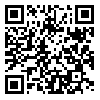Volume 19, Issue 1 (Spring 2024)
Salmand: Iranian Journal of Ageing 2024, 19(1): 144-157 |
Back to browse issues page
Download citation:
BibTeX | RIS | EndNote | Medlars | ProCite | Reference Manager | RefWorks
Send citation to:



BibTeX | RIS | EndNote | Medlars | ProCite | Reference Manager | RefWorks
Send citation to:
Nafei A, Rashedi V, Ghafori R, Khalvati M, Eslamian A, Sharifi D et al . Death Anxiety and Related Factors Among Older Adults in Iran: Findings From a National Study. Salmand: Iranian Journal of Ageing 2024; 19 (1) :144-157
URL: http://salmandj.uswr.ac.ir/article-1-2548-en.html
URL: http://salmandj.uswr.ac.ir/article-1-2548-en.html
Ayoub Nafei1 

 , Vahid Rashedi2
, Vahid Rashedi2 

 , Ronak Ghafori3
, Ronak Ghafori3 

 , Maliheh Khalvati4
, Maliheh Khalvati4 

 , Ayoub Eslamian5
, Ayoub Eslamian5 

 , Delnia Sharifi6
, Delnia Sharifi6 

 , Marjan Haghi *7
, Marjan Haghi *7 




 , Vahid Rashedi2
, Vahid Rashedi2 

 , Ronak Ghafori3
, Ronak Ghafori3 

 , Maliheh Khalvati4
, Maliheh Khalvati4 

 , Ayoub Eslamian5
, Ayoub Eslamian5 

 , Delnia Sharifi6
, Delnia Sharifi6 

 , Marjan Haghi *7
, Marjan Haghi *7 


1- Academic Center for Education, Culture and Research (ACECR), Shahid Beheshti University of Medical Sciences, Tehran, Iran.
2- Department of Aging, Iranian Research Center on Aging, University of Social Welfare and Rehabilitation Sciences, Tehran, Iran.
3- Education Organization of District 9, Tehran, Iran.
4- Department of Social Work, Social Determinants of Health Research Center, School of Paramedical and Rehabilitation Sciences, Mashhad University of Medical Sciences, Mashhad, Iran.
5- Department of Social Work, School of Behavioral Sciences, University of Social Welfare and Rehabilitation Sciences, Tehran, Iran.
6- Department of Occupational Therapy, School of Rehabilitation Sciences, Shahid Beheshti University of Medical Sciences, Tehran, Iran.
7- Department of Aging, Iranian Research Center on Aging, University of Social Welfare and Rehabilitation Sciences, Tehran, Iran. ,marjanhaghi@yahoo.com
2- Department of Aging, Iranian Research Center on Aging, University of Social Welfare and Rehabilitation Sciences, Tehran, Iran.
3- Education Organization of District 9, Tehran, Iran.
4- Department of Social Work, Social Determinants of Health Research Center, School of Paramedical and Rehabilitation Sciences, Mashhad University of Medical Sciences, Mashhad, Iran.
5- Department of Social Work, School of Behavioral Sciences, University of Social Welfare and Rehabilitation Sciences, Tehran, Iran.
6- Department of Occupational Therapy, School of Rehabilitation Sciences, Shahid Beheshti University of Medical Sciences, Tehran, Iran.
7- Department of Aging, Iranian Research Center on Aging, University of Social Welfare and Rehabilitation Sciences, Tehran, Iran. ,
Abstract: (5568 Views)
Objectives Aging is one of the most critical stages in human life. Today, older adults make up one of the largest social groups in the world. Death anxiety is one of the most common mental disorders in old age, whose prevalence varies due to individual differences, social/environmental factors, and views on death. This national study aims to investigate death anxiety and related factors in Iranian older adults.
Methods & Materials This is a descriptive-analytical study with a cross-sectional design. The study population in this study is all people aged ≥60 years in Iran. Online sampling was done through social networks using a convenience method for 51 days from June 22 to July 11, 2021. The data collected tool was a questionnaire. The first part was a demographic form surveying age, marital status, housing conditions, household living arrangements, province of residence, place of residence (urban or rural), level of education, ethnicity, religion, and insurance coverage. The second part was the Templer death anxiety scale. The data was analyzed using t-test, ANOVA and regression analysis in SPSS software, version 22.
Results Participants were 1271 women and 1858 men aged 60-80 years. The mean score of death anxiety was 8.5±3.44, 42.5% had severe death anxiety, 40.7% had moderate anxiety, and 16.9% had mild anxiety. A significant difference was observed in death anxiety in terms of age, gender, marital status, household living arrangements, occupation, religion, insurance coverage (P<0.05), but no significant difference was observed in terms of housing conditions, place of residence (urban or rural), educational level, or ethnicity (P>0.05).
Conclusion Death anxiety is a common phenomenon among Iranian older adults. There is a need to develop online programs to reduce this problem.
Methods & Materials This is a descriptive-analytical study with a cross-sectional design. The study population in this study is all people aged ≥60 years in Iran. Online sampling was done through social networks using a convenience method for 51 days from June 22 to July 11, 2021. The data collected tool was a questionnaire. The first part was a demographic form surveying age, marital status, housing conditions, household living arrangements, province of residence, place of residence (urban or rural), level of education, ethnicity, religion, and insurance coverage. The second part was the Templer death anxiety scale. The data was analyzed using t-test, ANOVA and regression analysis in SPSS software, version 22.
Results Participants were 1271 women and 1858 men aged 60-80 years. The mean score of death anxiety was 8.5±3.44, 42.5% had severe death anxiety, 40.7% had moderate anxiety, and 16.9% had mild anxiety. A significant difference was observed in death anxiety in terms of age, gender, marital status, household living arrangements, occupation, religion, insurance coverage (P<0.05), but no significant difference was observed in terms of housing conditions, place of residence (urban or rural), educational level, or ethnicity (P>0.05).
Conclusion Death anxiety is a common phenomenon among Iranian older adults. There is a need to develop online programs to reduce this problem.
Type of Study: Research |
Subject:
Psychology
Received: 2022/12/18 | Accepted: 2023/05/14 | Published: 2024/04/01
Received: 2022/12/18 | Accepted: 2023/05/14 | Published: 2024/04/01
Send email to the article author
| Rights and permissions | |
 |
This work is licensed under a Creative Commons Attribution-NonCommercial 4.0 International License. |





